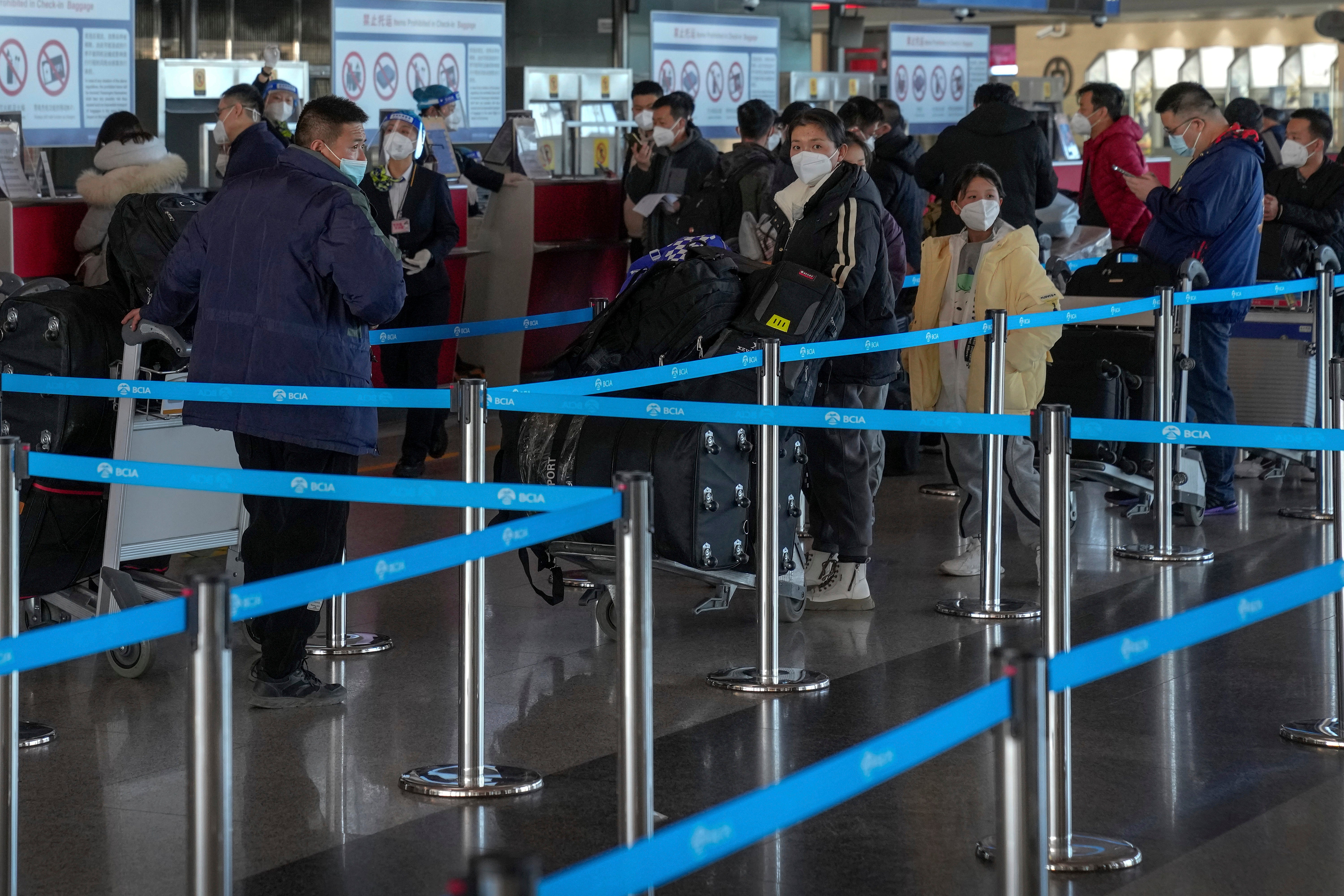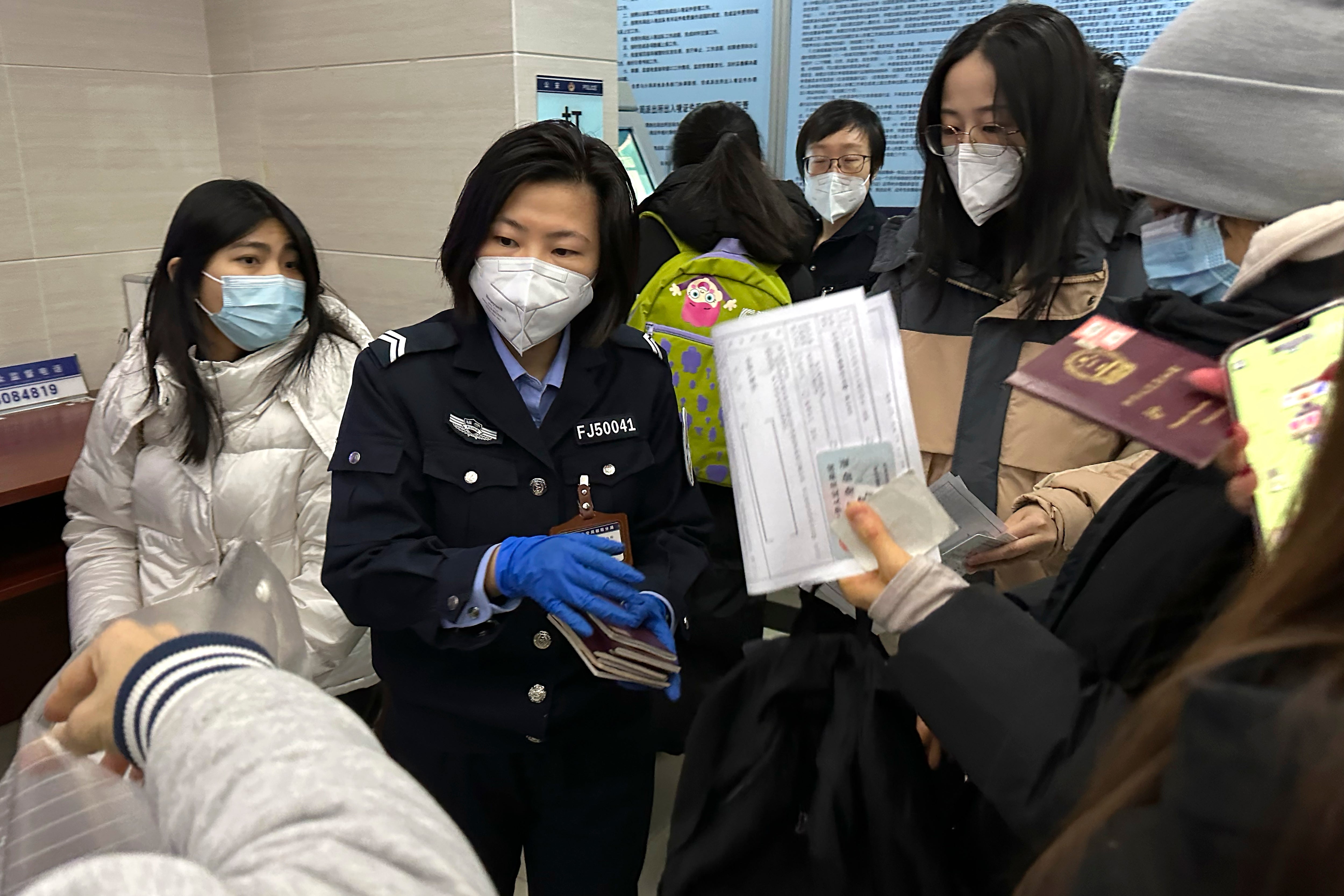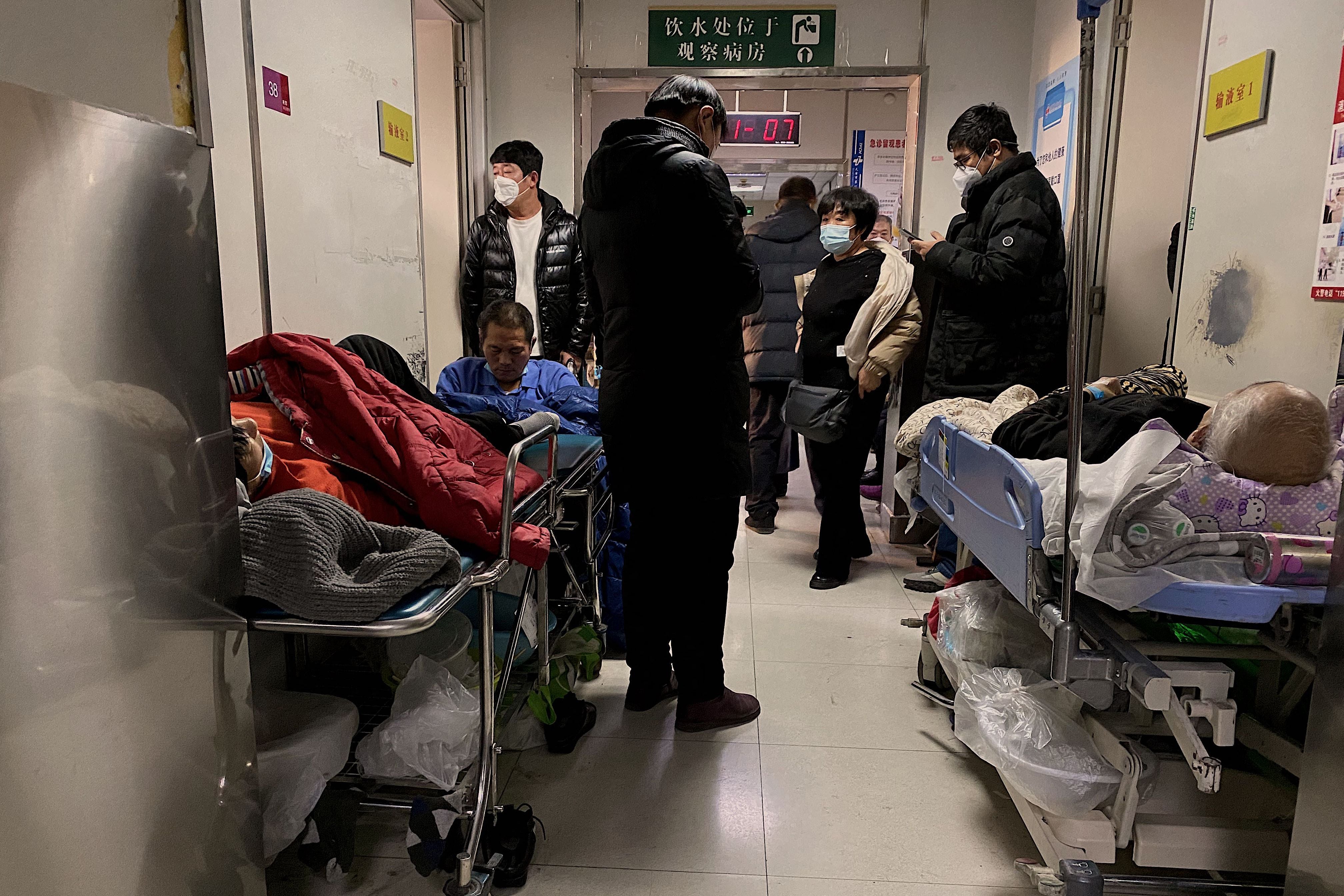
The government is under pressure to introduce restrictions on people entering the UK from China amid surging Covid cases in the country.
Ministers on Thursday said they were reviewing whether to require travellers from China to take Covid tests – 24 hours after saying they had no plans to introduce mandatory checks – but were not taking direct action.
On Friday Spain became the latest country to announce it would require people entering the country from China to test negative for Covid or prove they have been fully vaccinated against the disease.
“At a national level, we will implement airport controls requiring all passengers coming from China to show a negative Covid-19 test or proof of a full vaccination course,” health minister Carolina Darias told reporters.
It came after US announced on Wednesday that all arrivals from China from 5 January would have to provide a negative test result taken no more than two days before their flight.
India, Italy, Taiwan, South Korea, Malaysia and Japan have also said they would place restrictions on travellers arriving from China, after Beijing announced it was abandoning its Covid-zero policy and preparing to reopen its borders.
On Friday, the chairman of the Joint Committee on Vaccination and Immunisation said putting restrictions on travellers from China was unlikely to prevent new Covid variants reaching the UK.
Professor Andrew Pollard said it was very difficult to know whether any new variant that emerged in China would have a significant impact in Britain.
“Trying to ban a virus by adjusting what we do with travel has already been shown not to work very well. We have seen that with the bans on travel from various countries during the pandemic,” he told the BBC Radio 4 Today programme.
“The important thing is that we have surveillance that when a virus is spreading within our population here in the UK or Europe we are able to pick that up and predict what might happen with the health systems and particularly the more vulnerable in the population.”

But University of Warwick virologist professor Lawrence Young said the government’s decision to delay restrictions was “dangerous” and risked introducing a new variant to the UK.
“We are opening ourselves up to more infections and we’re running the risk of new variants coming into the country,” Professor Young told The Independent.
“If we’re not monitoring as people arrive, we’re putting ourselves at great risk,” he added.
“There’s a general sense of complacency around Covid, although infections and hospitalisations are still quite high.
“When you have something that’s such a widespread infection in such a large population like China where we’re seeing severe disease and death, although the official numbers aren’t quite matching what’s on the ground, then we know we’ve got an issue where there’s more infection and the potential development of new variants from that.”
Speaking on Thursday afternoon, health minister Will Quince said the government believed the “key threat” would be whether there was any new Covid variant from China, adding that “there's no evidence at this point”.
“A lot of people will be concerned about the news coming out of China,” he said.

“The secretary of state for health and social care [Steve Barclay] met with the chief executive of the UK Health Security Agency and the chief medical officer this morning, so it's being taken incredibly seriously by the government.
“The key threat is any new variant. There's no evidence at this point of a new variant from China, a variant that is not already prevalent here in the UK.
“But, nevertheless, we're keeping the situation very much under review.”
Speaking on a visit to Manchester airport on Thursday, defence secretary Ben Wallace said the idea of introducing more restrictions was being looked at “as we speak” and that there could be an announcement on Thursday or Friday.
But speaking to BBC Radio 4’s Today programme, former health minister Lord Bethell praised Italy’s “sensible” approach of quarantining those who test positive on arrival.
This strategy would allow results to be trusted and for genomic testing to be carried out to understand whether any new variants are emerging, he said.
“I think there are different reasons to bring in testing – one is the American approach which is pre-testing to slow the spread.”
Up to half of Chinese visitors arriving at Milan’s Malpensa airport on two flights on 26 December were found to have Covid-19, officials said.
On the first flight, some 38 per cent of passengers tested positive and on the second, 52 per cent were positive, according to Guido Bertolaso, a senior official for the region of Lombardy.
Italian authorities said they would use the swabs taken from passengers to try and identify any new variants arriving from China.

However, opinion is divided among experts who believe that introducing testing may not be possible in the UK due to the lack of facilities to quarantine people and little sign of a new variant emerging in China.
“Countries like Singapore and Taiwan still have quarantine facilities in place. If you’re trying to stop chains of transmission you have to do something with people tested,” Professor Linda Bauld, head of public health at the University of Edinburgh, told The Independent.
“Another reason I think Australia and UK are not doing anything other than saying they want to know more about China’s Covid information is that the variants causing the huge infections are still this Omicron family which we’ve already had big surges for and from data the vaccines still hold up well.”
However, she added the “big unknown” is what new Covid variants could be developed as a lack of restrictions to travel and if a competitor to Omicron did arise, restrictions would be needed.
Professor Azeem Majeed similarly added that testing travellers arriving from China would not make a large difference because Covid rates are already high in the UK and restrictions would only be introduced if a new variant began emerging from China.
However, Professor Young emphasised that a lack of restrictions “made no sense” and could go on to compound rising infections and put more pressure on the NHS.

In a statement explaining its decision to impose restrictions, the US Centres for Disease Control and Prevention (CDC) cited the surge in infections and what it said was a lack of adequate and transparent information from China, including genomic sequencing on the viral strains circulating in the country.
Italy is so far the only country in Europe and EU member state to have set the new Covid rules.
The European Commission’s health security committee met on Thursday to discuss “possible measures for a co-ordinated EU approach” to China’s Covid situation.
The bloc’s health officials agreed to continue talks on seeking a common approach to travel rules, though they have so far resisted pressure from Italy to adopt that member state’s approach.
The European Commission said in a statement that the BF7 omicron variant prevalent in China is already circulating in Europe and that its threat had not significantly grown.
“However, we remain vigilant and will be ready to use the emergency brake if necessary,” the EU’s executive said in a statement on Thursday afternoon.
On Friday, the UE health chief said the bloc should consider immediately scaling up genomic sequencing of Covid infections and monitoring of wastewater, including from airports, to detect any new variants given the virus surge in China.
In a letter to health ministers of the EU’s 27 members, Stella Kyriakides said the bloc should be “very vigilant” as China lifted travel restrictions as reliable epidemiological and testing data for China were quite scarce.
Ms Kyriakides advised ministers in the letter, which was reviewed by Reuters, to assess their current practices on genomic sequencing of the coronavirus “as an immediate step”.
Italian Premier Giorgia Meloni on Thursday said requiring Covid testing of all passengers “is only effective if it is taken at the European level” and noted that many people arrived in Italy on connecting flights through other European countries.







